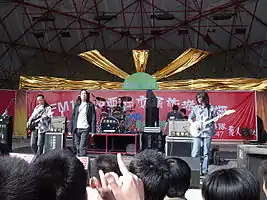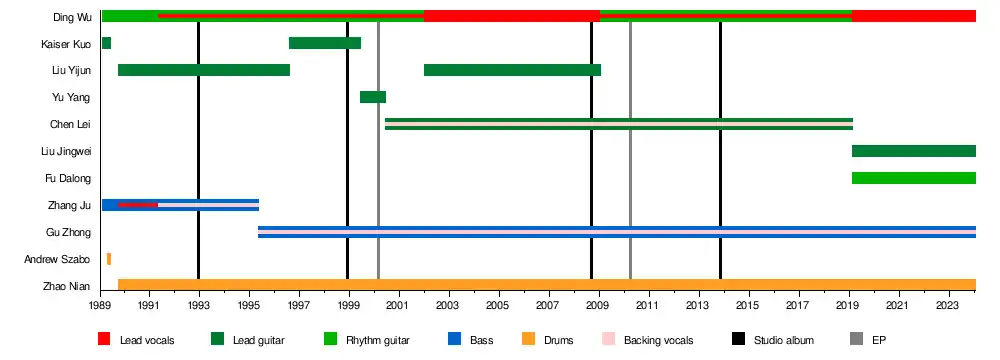Tang Dynasty | |
|---|---|
 Tang Dynasty performing in 2004. | |
| Background information | |
| Origin | Beijing, China |
| Genres | Progressive metal, heavy metal, folk metal, art rock |
| Years active | 1989–present |
| Labels |
|
| Members | Ding Wu Zhao Nian Gu Zhong Liu Jingwei Fu Dalong |
| Past members | Zhang Ju Liu Yijun Kaiser Kuo Chen Lei Yu Yang Andrew Szabo |
| Website | http://tangchao.ent.163.com |
Tang Dynasty (Chinese: 唐朝; pinyin: Táng Cháo) is a Chinese rock band formed in 1989. They are often credited as being the first Chinese heavy metal band.
Biography
Singer and rhythm guitarist Ding Wu, bassist Zhang Ju, and Chinese-American guitarist Kaiser Kuo co-founded Tang Dynasty in early 1989.[1] Kaiser left shortly after to return to the United States. Liu "Lao Wu" Yijun took his place and, according to Kaiser, went on to become China's first "guitar hero."[1] In 1991, the band released its metal/rock version of "The Internationale" in Chinese.
Tang Dynasty rose to fame with their eponymous debut album, released in December 1992. The album officially sold about 2,000,000 authentic copies throughout Asia and abroad, not counting the multitudes more of infringing copies. Their sound is part progressive rock and artistic metal and part traditional Chinese vocal technique. The lyrical poetry and musical arrangements meant to hearken back to the glorious days of ancient Chinese civilization; in particular, the art and cultural epitome of Chinese history as popularly represented by the era of the Tang dynasty.
Bassist Zhang Ju died on May 11, 1995, when his motorcycle collided with a truck on the Zizhuqiao freeway overpass in western Beijing. Gu Zhong became bass player, but in August Liu left the band. Co-founder Kaiser Kuo rejoined as guitarist in August 1996.[1]
The band's 1998 release Epic was their second album, seven years after their debut record. Kaiser again parted company with Tang Dynasty in June 1999 and later formed another well-recognized metal/rock band, Spring and Autumn (Chunqiu).[1][2] Kaiser was replaced by former Iron Kite frontman Yu Yang, and then by young guitar virtuoso Chen Lei in late 2000. After some more member changes, Liu rejoined the group in 2002.
Tang Dynasty released their third album Romantic Knight ("Langman Qishi") in mid-2008, featuring "Feng Shan Ji" as the album's lead track.[3] Kaiser appeared in the Western documentary by Sam Dunn, Global Metal, released that same year.[4]
In January 2009, Liu announced his second departure of the band due to "personal reasons." Vocalist Ding filled the spot of second guitarist.[5] In February 2010, Ding Wu announced that the band was preparing for their fourth release due out later in the year.[6] The next month, Tang Dynasty put out a two-song EP entitled Ups and Downs. The band released their fourth album, Thorn, in November 2013, and toured outside China for the first time in nearly two decades.
On February 20, 2019, Tang Dynasty revealed on Weibo that lead guitarist Chen Lei had been replaced by Liu Jingwei and Fu Dalong, again making the band a five-piece lineup.[7]
Members
|
|
Timeline

Discography
Studio albums
- 1992 - 唐朝 (Tang Dynasty)
- 1998 - 演义 (Epic)
- 2008 - 浪漫骑士 (Romantic Knight)
- 2013 - 芒刺 (Thorn)
EPs
- 2000 - 演义单曲纪念珍藏版 (Epic (single))
- 2010 - 沉浮 (Ups and Downs)
Compilations
- 90 Modern Music Concert (1990) - "谁都希望"; "粉雾"
- China Fire I (1992) - "飞翔鸟"
- A Tribute to Teresa Teng (1995) - "独上西楼"
- Goodbye Zhang Ju (1997) - "月梦"
- True Love Forever (2000) - "花儿为什么这样红"; "明月千里寄相思"
- Gift - "春蚕"
See also
References
- 1 2 3 4 "Interview: Kaiser Kuo (Chunqiu, Tang Dynasty)". DeathMetal.org. October 17, 2008. Retrieved March 31, 2017.
- ↑ Kaiser Kuo: Biography
- ↑ Tang Dynasty Band for 2008 New Album Ethnic Prog Art Rock, Culture Express
- ↑ Review of Global Metal Archived 2016-03-09 at the Wayback Machine
- ↑ http://ent.newssc.org/system/2009/01/17/011480367.shtml (in Chinese)
- ↑ "Tang Dynasty rock band to release new EP - China.org.cn".
- ↑ "唐朝乐队2019开年首演 新阵容正式曝光亮相". QQ. 20 February 2019.
External links
- tangchao.ent
- Culture Express variety show hosted by Ji Xiaojun, featuring Tang Dynasty in studio for upcoming new record
- Tang Dynasty page from Rock in China site
- "Kaiser Kuo, Tang Dynasty, Spring and Autumn", from China Beat radio program